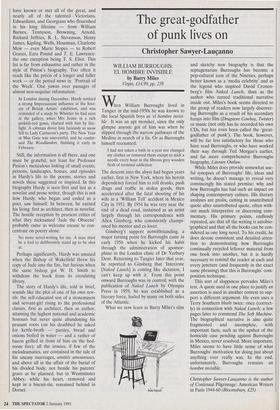The great-godfather of punk lives on
Christopher Sawyer-Laucanno
WILLIAM BURROUGHS: EL HOMBRE INVISIBLE by Barry Miles Virgin, £14.99, pp. 238 hen William Burroughs lived in Tangier in the mid-1950s he was known to the local Spanish boys as 'el hombre invisi- ble'. It was an apt moniker, since the only glimpse anyone got of him was when he slipped through the narrow pathways of the Medina in search of a fix. Or as Burroughs himself recounted:
I had not taken a bath in a year nor changed my clothes or removed them except to stick a needle every hour in the fibrous grey wooden flesh of terminal addiction.
The descent into the abyss had begun years earlier, first in New York, where his heroin dependency forced him to roll drunks, push drugs and traffic in stolen goods, then accelerated after the fatal shooting of his wife in a 'William Tell' accident in Mexico City in 1951. By 1954 he was very near the end of a dead road, sustained as an artist largely through his correspondence with Allen Ginsberg, who consistently champi- oned his mentor and ex-lover.
Ginsberg's support notwithstanding, a major turning point for Burroughs came in early 1956 when he kicked his habit through the administration of apomor- phine in the London clinic of Dr Yerbury Dent. Returning to Tangier later that year, he reported to Ginsberg that 'Interzone [Naked Lunch] is coming like dictation, I can't keep up with it.' From this point onward Burroughs was in control; with the publication of Naked Lunch by Olympia Press in 1959, he was established as a literary force, hailed by many on both sides of the Atlantic.
What we now learn in Barry Miles's slim
and sketchy new biography is that the septugenarian Burroughs has become a pop-cultural icon of the Nineties, perhaps better known as a 'media celebrity' and as the legend who inspired David Cronen- berg's film Naked Lunch, than as the author who turned traditional narrative inside out. Miles's book seems directed to the group of readers now largely discover- ing Burroughs as a result of his secondary forays into film (Drugstore Cowboy, Twister) or music (not only has he recorded his own CDs, but has even been called the 'great- godfather of punk'). The book, however, will be far less satisfactory for those who have read Burroughs, or who have worked their way through Ted Morgan's earlier, and far more comprehensive Burroughs biography, Literary Outlaw.
While Miles does provide somewhat use- ful synopses of Burroughs' life, ideas and writing, he doesn't manage to reveal very convincingly his stated premise: why and how Burroughs has had such an impact on shaping contemporary culture. His literary analyses are prolix, cutting in unattributed quote after unattributed quote, often with- out much interpretive or discerning com- mentary. His primary points, endlessly repeated, are that all the writing is autobio- 'graphical and that all the books can be con- sidered as one long novel. To his credit, he does devote consistent and detailed atten- tion to demonstrating how Burroughs continually recycled leftover material from one book into another, but it is hardly necessary to remind the reader at each and every juncture (and frequently in the exact same phrasing) that this is Burroughs' com- position technique.
This sort of sloppiness pervades Miles's text. A quote used in one place to justify an assertion is used in another context to sup- port a different argument. He even uses a Terry Southern blurb twice: once (correct- ly) in connection with Naked Lunch; a few pages later to commend The Soft Machine. The biographical narrative is also quite fragmented and incomplete, with important facts, such as the upshot of the homicide case pending against Burroughs in Mexico, never resolved. More important, Miles seems to have little sense of what Burroughs' motivation for doing just about anything ever really was. In the end, unfortunately, Burroughs remains an hombre invisible.
Christopher Sawyer-Lauganno is the author of Continual Pilgrimage: American Writers in Paris 1944-60 (Bloomsbury, £25)










































 Previous page
Previous page